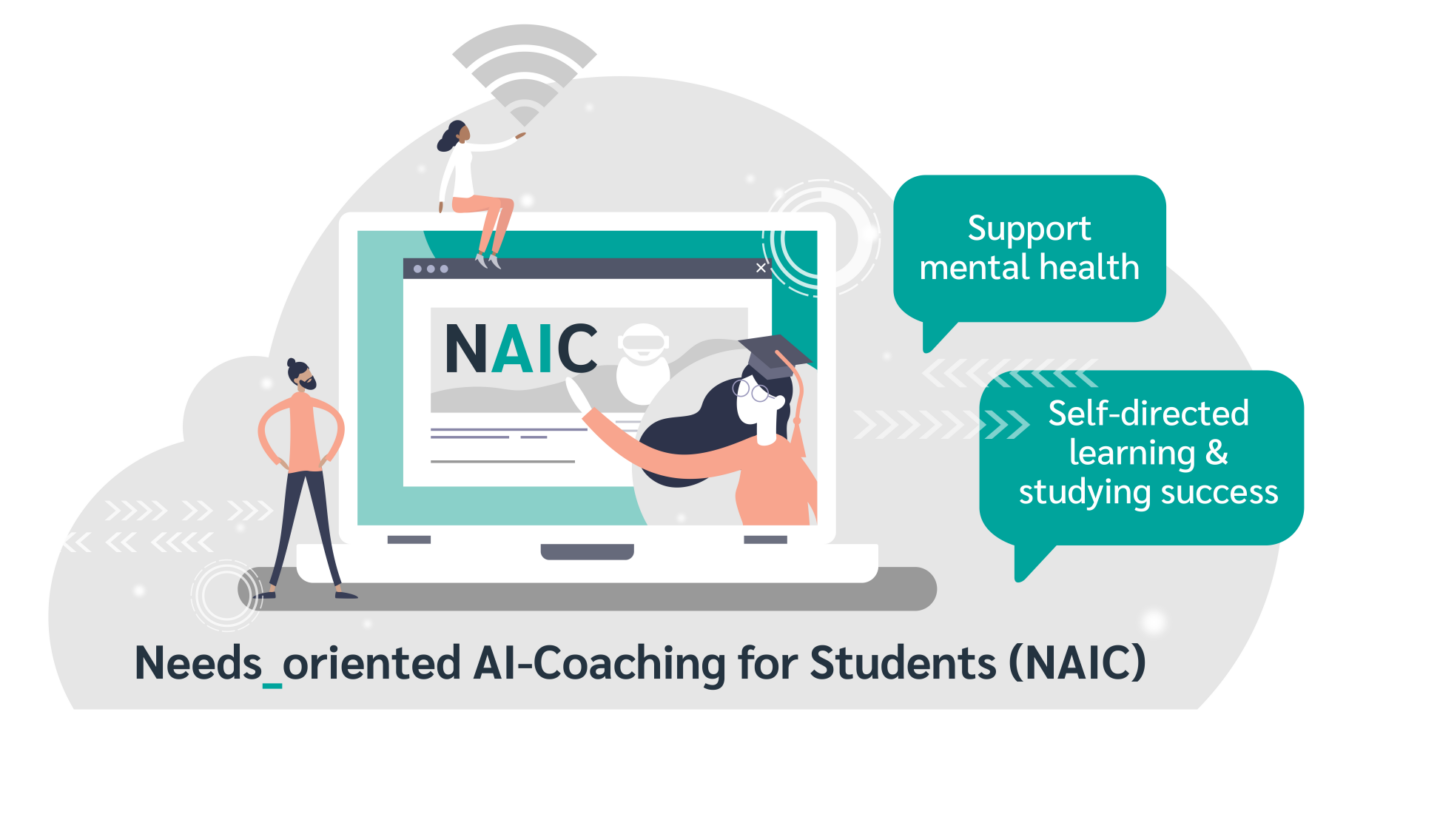Needs-Oriented AI-Coaching for Students (NAIC)
Within the junior research group Needs-oriented AI-Coaching for Students, the team is investigating the use and efficacy of AI-driven coaching methodologies in higher education. The primary focus is on exploring and developing intelligent and adaptive conversational agents to enable tailored learning journeys and personalized coaching support.
Furthermore, the group is investigating the use of AI and specifically NLP technologies for mental health support. In this new and fast-growing research field, the team is focusing on voice assistant-based interventions for mental health support of students as well as on the tracking of emotional and mental health states through conversational agents.
AI research in this research group is application-oriented, adhering to the human-centered design process and placing a strong emphasis on the diverse profiles of our target audience. This includes their sensory and cognitive (learning) abilities, as well as the scope of their individual and mental resources.
There is a widely shared consensus that AI technologies, particularly adaptive learning systems and the personalized delivery of optimized learning content, have the potential to enhance learning success. However, there is currently a lack of sound empirical studies on the use and impact of AI technologies in higher education — a gap that our research seeks to address.
Focus topics: Adaptive user interfaces, human-computer interaction, human-centered AI, participatory design, NLP, LLMs

Podcast about the NAIC Junior Research Group
In this ScaDS.AI podcast, we introduce the NICE junior research group, highlighting the research focus and previous successes of the research group in the area of the potential of AI-based communication agents for university coaches.
In this podcast series, we introduce you to each of the junior research groups and their projects. The researchers themselves talk about their work and give an insight into the future of their projects.
All articles are available as audio podcasts (in German only) and as text (in English). A full playlist of all podcast episodes is available on our YouTube channel.
Projects
- ESF Plus project: AI-based coaching of women in STEM subjects to improve academic success (KI-FEM)
- PhD-Project: AI-based mental health support for students – Multimodal delivery of personalized exercises and content to support the mental health of users through conversational agent-based CBT
- PhD-Project: Investigating the Impact of Generative Language Models on Students‘ Learning
- Teaching Project: To involve as many students as possible in our research and developments we initiated the course Participatory Research Methods for Study, Learning and Teaching (PaF) at TU Dresden.
- Training Project: We see it as our responsibility to bring our knowledge of AI and education to schools. This is why we conduct training sessions with pupils and teachers on the topic of AI in schools every year.
Furthermore, the group is partnering with research groups of the Karolinska Institute in Sweden with the long-term goal of applying our research to internet-based therapy platforms.
Team
Lead
The junior research group leader, Dr.-Ing. Claudia Loitsch, started at ScaDS.AI Dresden in January 2023. She studied Media Computer Science at the TUD Dresden University of Technology and obtained a doctorate in engineering at TUD Dresden University of Technology on the topic of Designing Accessible User Interfaces for All by Means of Adaptive Systems. For this work, Loitsch was awarded by the 3m5 Excellence award.
Since 2010, Loitsch delved into digital accessibility, human-computer interaction, adaptive user interfaces, and the fascinating field of artificial intelligence. Her research is on Diversity-aware design – an endeavor where technology adapts itself to human abilities and needs, not the other way around. It’s not just about those with disabilities. It’s about each of us, with our ever-changing needs and skills, whether in a specific moment, environment or across a lifetime. This research lays the foundation for the design and development of adaptive AI-driven UIs that groove with the disparities in human capacities, diverse work methodologies or learning behaviors, or individual preferences and requirements in the context of digital technologies.
Her scientific achievement is centered on enhancing the field of accessible User Interface (UI) engineering by integrating user-adaptive design and knowledge-based modeling to cater to the needs of people with diverse needs, including people with disabilities. Loitsch developed an integrated semantic knowledge base for computation and automation of User Interface (UI) adaptation in the scope of eAccessibility and Usability. The core contribution of this achievement lies in addressing the heterogeneity and complexity of customization options of ICT as well as the fragmented nature of existing know-how across various user domains and target groups, while also formalizing a structured approach to extend this knowledge for effective UI adaptation and scalability to other contexts.

Dr.-Ing. Claudia Loitsch
TUD Dresden University of Technology
Center for Interdisciplinary Digital Sciences (CIDS)
Team Members

Julian Striegl
TUD Dresden University of Technology
Center for Interdisciplinary Digital Sciences (CIDS)

Chrakhan Barzanji
TUD Dresden University of Technology
Center for Interdisciplinary Digital Sciences (CIDS)

Niclas Rosteck
TUD Dresden University of Technology
Center for Interdisciplinary Digital Sciences (CIDS)
Advisor

Prof. Dr. Gerhard Weber
TUD Dresden University of Technology
Chair of Human-Computer Interaction
Student Assistants
- Jonas Richartz
- Vanessa Kuhfs
- Sebastian Eberl
Publications
- Striegl, J., Richter, J. W., Grossmann, L., Bråstad, B., Gotthardt, M., Ruck, C., Wallert, J. & Loitsch, C. Deep Learning-based Dimensional Emotion Recognition for Conversational Agent-based Cognitive Behavioral Therapy. (accepted for Publication in peerJ computer Science)
- Striegl, J., Rottmann, S., Loitsch, C. (2024, September) Effectiveness and Acceptance of Conversational Agent-based Psychotherapy for Depression and Anxiety Treatment: Methodological Literature Review (accepted for publication at Intelligent Systems Conference 2024)
- Guhr, O., Loitsch, C., Weber, G., Böhme, HJ. (2024). Enhancing Usability of Voice Interfaces for Socially Assistive Robots Through Deep Learning: A German Case Study. In: Degen, H., Ntoa, S. (eds) Artificial Intelligence in HCI. HCII 2024. Lecture Notes in Computer Science(), vol 14736. Springer, Cham. https://doi.org/10.1007/978-3-031-60615-1_15
- Loitsch, Claudia & Striegl, Julian (2024). AI for Inclusive Learning in Higher Education: Diversity, Accessibility, and Mental Health. In: Vanessa Heitplatz & Leevke Wilkens (eds.). Rehabilitation Technology in Transformation: A Human-Technology-Environment Perspective, 595–612. Dortmund: Eldorado. http://dx.doi.org/10.17877/DE290R-24364
- Striegl, J., Fekih, F., Weber, G., Loitsch, C. (2024). Chatbot-Based Mood and Activity Journaling for Resource-Oriented CBT Support of Students. In: Duffy, V.G. (eds) Digital Human Modeling and Applications in Health, Safety, Ergonomics and Risk Management. HCII 2024. Lecture Notes in Computer Science, vol 14710. Springer, Cham. https://doi.org/10.1007/978-3-031-61063-9_12
- Striegl, J., Loitsch, C., & Weber, G. (2023, July). Voice Assistant-Based Cognitive Behavioral Therapy for Test Anxiety in Students. In International Conference on Human-Computer Interaction (pp. 396–406). Cham: Springer Nature Switzerland.
- Striegl, J., Gotthardt, M., Loitsch, C., & Weber, G. (2022, July). Investigating the usability of voice assistant-based CBT for age-related depression. In International conference on computers helping people with special needs (pp. 432-441). Cham: Springer International Publishing.
- Gotthardt, M., Striegl, J., Loitsch, C., & Weber, G. (2022, July). Voice assistant-based CBT for depression in students: effects of empathy-driven dialog management. In International Conference on Computers Helping People with Special Needs (pp. 451–461). Cham: Springer International Publishing.
Events
- June 2024 – Lecture series on AI-based mental health at the Karolinska Institute
- June 2024 – Local Meetup: From Bias to Balance: AI in tomorrow’s education as part of the University Future Festival
- May 2024 – AI and Design Thinking workshop with women of the Protechnical participants (prospective female students after high school graduation), organized together with the Diversity Management of TU Dresden
- March 2024 – Workshops at the EWVT secondary school on the topic of AI in schools with teachers from all disciplines
- March 2024 – Speaker at the symposium “Inclusion and AI”, organized by the Protestant School Foundation
- February 2024 – Participation in the interdisciplinary barcamp on artificial intelligence in higher education: Interdisziplinäres Barcamp zu Künstlicher Intelligenz im Hochschulbereich – Bildungsportal Sachsen
- January 2024 – Workshops at EWVT-Gymnasium on the topic of AI at school with all Year 10 pupils (168 in total)


